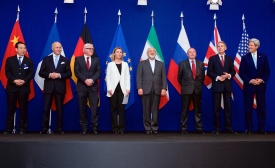diplomacy
Rosy Senanayake and Kumar Sangakkara are two extremely popular Sri Lankans and shadows that have befallen their careers have caused heartburn among their fans. [...] This brings in the key question: Can anyone who is not a professional diplomat and wants to be one or is selected as one be a successful diplomat?
If Congress rejects the deal, we will project globally an America that is internally divided, unreliable, and dismissive of the views of those with whom we built Iran’s sanctions architecture in the first place. I and other American diplomats around the world draw every day on our nation’s soft power, which greatly enhances our ability to mobilize other countries to our side.
Iran's approach to foreign policy changed dramatically after Hassan Rouhani was elected President of Iran in 2013. The most serious and comprehensive negotiations regarding Iran’s nuclear program started in 2013 between Iran and six world powers including the United States. An interim agreement was reached on November 24, 2013. A framework agreement was reached on April 2, 2015. And finally, the comprehensive deal was reached on July 14, 2015 to ensure that Iran’s potential pathway to developing a nuclear weapon is blocked.

Hardliners on both sides have ramped up their efforts to sabotage the deal, while both governments are trying very hard to defend the deal and present it as a historical victory, which it truly is. The publicity that the Iran Deal debates has gotten has allowed both the Iranian and American governments to portray their countries as pragmatic, pro-diplomacy, and pro-peace—thereby enhancing their soft power, as opposed to repellently boasting about their hard power.
Despite decades of U.S. sanctions against Iran, change came when the U.S. worked with Britain, France, Germany, Russia, China and the EU to forge the diplomatic agreement. The glue holding those relations together is U.S. credibility.
Diplomacy has resumed its role, trumping 'go it alone' military interventions. [...] The fruitful culmination of negotiations between world powers and Iran over its nuclear program, are yet another indication to the global shift in International Relations, away from unilateral military solutions, and back towards multilateral diplomacy.
This second stage of reform includes a reboot of the priorities of the ministry and its personnel, the implementation of modern approaches to personnel management, improvement of consulates' work, and the adoption of a new edition of the law on diplomatic service. In addition, Betsa said that the ministry had announced the launch of a new focus public diplomacy, with cultural diplomacy included.







